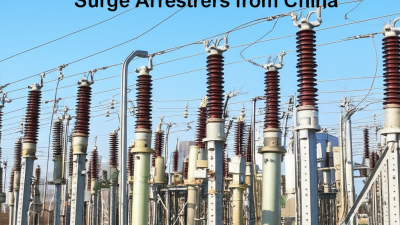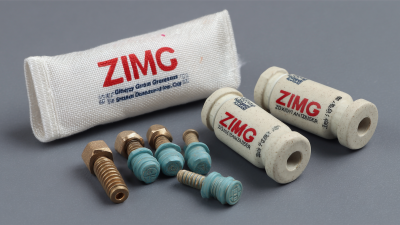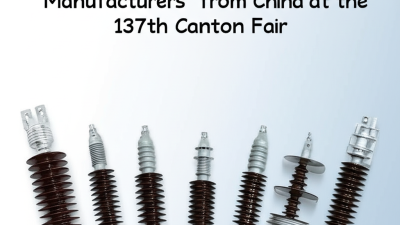
-
Home
-
About Us
-
Products
-
News
-
Blog
-
Contact Us
Leave Your Message

In today's industrial landscape, safety is paramount, particularly when dealing with electrical systems that can pose significant hazards. One critical component in enhancing electrical safety is the incorporation of Cooper Power Fuses, which are designed to protect electrical equipment from overloads and short circuits.
 These fuses not only ensure the reliability of industrial operations but also contribute to a safer working environment by minimizing the risk of electrical failures. This guide will explore the various benefits and applications of Cooper Power Fuses in industrial settings, offering insights into how they can be effectively implemented to enhance electrical safety.
From understanding the different types of Cooper Power Fuses to best practices for maintenance and installation, this blog aims to equip industrial professionals with the knowledge needed to safeguard their facilities against electrical hazards.
These fuses not only ensure the reliability of industrial operations but also contribute to a safer working environment by minimizing the risk of electrical failures. This guide will explore the various benefits and applications of Cooper Power Fuses in industrial settings, offering insights into how they can be effectively implemented to enhance electrical safety.
From understanding the different types of Cooper Power Fuses to best practices for maintenance and installation, this blog aims to equip industrial professionals with the knowledge needed to safeguard their facilities against electrical hazards.
Cooper Power fuses play a pivotal role in enhancing electrical safety within industrial settings, where the risk of electrical faults can lead to significant operational disruptions and safety hazards. According to the Institute of Electrical and Electronics Engineers (IEEE), electrical faults account for approximately 30% of all industrial accidents, emphasizing the critical importance of robust protective measures. Cooper Power fuses are designed to provide accurate overload protection and to promptly isolate faulted circuits, significantly reducing the risk of electrical incidents.
Moreover, the use of Cooper Power fuses can lead to substantial operational efficiencies. A report from the National Fire Protection Association (NFPA) reveals that equipment failures, often due to electrical issues, can result in downtime costing industries up to $1 million per incident. Implementing Cooper Power fuses not only mitigates these risks but also supports compliance with safety regulations, thereby safeguarding both personnel and assets. By integrating these fuses, facilities can achieve a remarkable enhancement in their safety protocols while benefiting from increased reliability and reduced maintenance costs.
Cooper Power fuses play a critical role in enhancing electrical safety within industrial applications by providing reliable protection systems. These fuses are designed to interrupt electrical circuits in the event of an overload or fault condition, thereby preventing potential damages to equipment and reducing the risk of fire hazards. Their functionality is rooted in their fast-acting response to current surges, which allows them to operate effectively in various environments, including manufacturing plants, distribution facilities, and more.
 The design of Cooper Power fuses incorporates advanced materials and technology to ensure reliable performance under extreme conditions. They are calibrated to operate within specific current ranges, and when the current exceeds these limits, the fuse element melts, effectively opening the circuit. This rapid interruption minimizes the potential for catastrophic failures and helps maintain the integrity of the entire electrical system. Furthermore, regular maintenance and testing of these fuses are essential to ensure their proper functioning, ultimately enhancing the overall safety of industrial operations. By integrating Cooper Power fuses into protection systems, industries can safeguard their assets and promote a safer working environment.
The design of Cooper Power fuses incorporates advanced materials and technology to ensure reliable performance under extreme conditions. They are calibrated to operate within specific current ranges, and when the current exceeds these limits, the fuse element melts, effectively opening the circuit. This rapid interruption minimizes the potential for catastrophic failures and helps maintain the integrity of the entire electrical system. Furthermore, regular maintenance and testing of these fuses are essential to ensure their proper functioning, ultimately enhancing the overall safety of industrial operations. By integrating Cooper Power fuses into protection systems, industries can safeguard their assets and promote a safer working environment.
Cooper Power Fuses play a crucial role in enhancing electrical safety and reliability within industrial applications. With an impressive interrupting capacity, these fuses effectively prevent equipment damage during fault conditions. According to the Electric Power Research Institute, approximately 80% of electrical system failures can be traced back to failure in protection devices. The robust design features of Cooper Power Fuses, including their long thermal and short-circuit capacities, provide essential protection for critical equipment, significantly reducing the risk of costly downtimes.
 One standout feature is the arc-extinguishing technology incorporated in Cooper Power Fuses, which minimizes the duration and intensity of electrical faults. This technology not only safeguards the infrastructure but also protects workforce safety, aligning with the National Institute for Occupational Safety and Health’s findings that over 46,000 electrical injuries occur each year in the industrial sector. Additionally, the fuses come with a high degree of reliability, boasting a high voltage rating that exceeds industry standards and ensures operational continuity in the most demanding environments. As industries increasingly focus on safety and reliability, integrating Cooper Power Fuses is becoming a best practice in electrical system management.
One standout feature is the arc-extinguishing technology incorporated in Cooper Power Fuses, which minimizes the duration and intensity of electrical faults. This technology not only safeguards the infrastructure but also protects workforce safety, aligning with the National Institute for Occupational Safety and Health’s findings that over 46,000 electrical injuries occur each year in the industrial sector. Additionally, the fuses come with a high degree of reliability, boasting a high voltage rating that exceeds industry standards and ensures operational continuity in the most demanding environments. As industries increasingly focus on safety and reliability, integrating Cooper Power Fuses is becoming a best practice in electrical system management.
When implementing Cooper Power fuses in industrial electrical applications, following best practices is essential for maximizing safety and efficiency. First, it's important to select the right type of fuse based on the specific requirements of your electrical system. Cooper Power fuses come in a variety of ratings and configurations, making it critical to assess the load characteristics and potential fault conditions to ensure appropriate protection. Utilizing fuses with the correct ampacity helps prevent nuisance trips while safeguarding equipment from overloads and short circuits.
Another key best practice is regular maintenance and testing of the fuses. Scheduled inspections can identify signs of wear, corrosion, or damage that could compromise performance. Additionally, employing thermal imaging technology can detect heated connections or components that may lead to failure. Ensuring that the fuses are installed in accessible locations will simplify the maintenance process and allow for timely checks, contributing to the reliability of the entire electrical system. By adhering to these practices, industrial facilities can enhance power safety, minimize downtime, and prolong the lifespan of their electrical infrastructure.
When it comes to industrial safety solutions, Cooper Power Fuses often face misconceptions that can hinder their effective application. One common myth is that fuses are outdated technology. However, advancements in Cooper Power Fuse designs have ensured they provide reliable protection in modern industrial environments. They are engineered to respond quickly to overcurrent situations, minimizing the risk of equipment damage and ensuring worker safety.
Another misconception is the belief that all fuses are created equal. In reality, the specifications and applications of Cooper Power Fuses are tailored to meet various industrial needs, such as differing voltage ratings and interrupting capacities. To enhance safety, it is crucial to select the right fuse for your specific application.
**Tip:** Always conduct a thorough analysis of your operational requirements and consult with a safety expert to determine the appropriate Cooper Power Fuse for your facility. Regular inspection and maintenance of these fuses can also prevent unexpected failures, ensuring a safer working environment. Remember, a well-informed approach can significantly enhance the efficacy of your safety measures in industrial applications.
| Misconception | Explanation | True Fact |
|---|---|---|
| All fuses are the same | Many assume any fuse can be used interchangeably in applications. | Different fuses are designed for specific voltage and current conditions. |
| Fuses are not necessary for low voltage applications | Some believe low voltage systems can operate safely without fuses. | Fuses provide important overcurrent protection in all voltage environments. |
| Fuses can be reset and reused | There is a belief that once a fuse blows, it can simply be reset. | Fuses are one-time use components that must be replaced after operation. |
| Fuses do not need regular inspection | It's commonly thought that as long as a fuse hasn’t blown, it’s fine. | Regular inspections are crucial to ensure fuses are in good condition. |
| Fuses are only for protection, not performance | Some think fuses only serve a protective function and have no impact on performance. | The right fuses can enhance performance by maintaining optimal current flow. |





